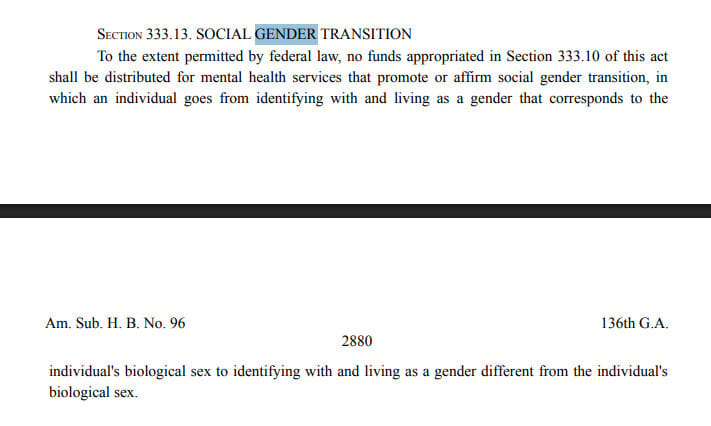Shane Blackheart depends on Medicaid for the psychiatric medications that help them sleep at night, and the therapy sessions that keep them stable. Like thousands of other Ohioans, Blackheart relies on state-funded mental health services. Now, language buried in Ohio's newly enacted budget has Blackheart and others wondering whether simply being transgender could cost them access to care that has nothing to do with their gender identity. Mental health providers across the state are grappling with the same question: how do you maintain basic therapeutic relationships when acknowledging who your patients are might trigger funding cuts… or worse?
Ohio Governor DeWine signed House Bill 96, the 2026-2027 biennial operating budget, into law on June 30. While he vetoed some of the most heinous line items—like one denying funding to any homeless shelter that might refuse to misgender a child in need of a bed—several vaguely-worded and disturbing items still remain.
One of these, of concern to Blackheart, a disabled trans fiction author whose Bluesky posts first alerted me to this story, is a line in Section 333.13 that states Medicaid funds will be withheld from any “mental health services that promote or affirm social gender transition.”

Screenshot from HB96
“As a disabled trans Ohioan, I rely on Medicaid to have access to healthcare, including my medications,” Blackheart tells me via DM. “I have a few mental healthcare needs, one being a specialist who deals with clients who have PTSD and another a case manager, who helps me remain independent and living on my own. I also take a few psychiatric medications that my psychiatrist prescribes, and if I had to go without them, I'd end up in the hospital. My medication is the reason I sleep, and it's how I keep myself safe. I require a lot of help from mental health services, so this bill terrifies me. I cannot afford these services or my medication without help from Medicaid.”
Amanda Kostura, LISW-S, and the Founder & Executive Director at Carve Your Own Path, Inc. sees this as a direct conflict with the professional mandates they must adhere to as a therapist. “I have an ethical obligation to stand by my clients and community in advocating for human rights and access to resources. It is literally a part of our ethical code,” they say in an email. When asked how the content of this bill makes them feel, they echo something I’ve heard from providers and patients alike—exhausted. “Our Trans and Gender Non-conforming community is regularly suffering from bigotry, harassment, and harm on the individual and systemic level. The suicide rates are extremely high in this population, and we as providers are frustrated that we can't get them the care and dignity they have a right to and deserve.”
Kostura isn’t backing down from their affirming position, but they also don’t rely on funds from Medicaid to keep the doors open. “I am thankful that we are already set up with the most privacy and safety possible with a private pay set-up, so I don't have to follow unethical and harmful insurance policies. However, many community members aren't privileged to access this care, relying on Medicaid to get their necessary services. The continued cuts to healthcare and denial of trans people's existence will exacerbate the current mental health crisis.”
The bill seems to target anyone who so much as uses the pronouns their patient or client tells them to use, regardless of whether they are actually providing any kind of care related to gender transition. It is the ambiguity of the bill that strikes Blackheart. “My biggest concern is the extremely vague wording. [...] I try not to catastrophize too much, but there's no denying this is extremely dangerous. I could lose the life-saving care I need for conditions wholly unrelated to my gender identity or my transition. I started receiving this care before I even came out as trans.”
As Ohio's budget takes effect, the real-world implications of Section 333.13 remain unclear. The ambiguous language leaves both patients and providers in a precarious position, forced to navigate an impossible choice between affirming care and financial survival. For transgender Ohioans already facing elevated rates of mental health crises, this uncertainty represents yet another barrier to care that could literally mean the difference between life and death.
